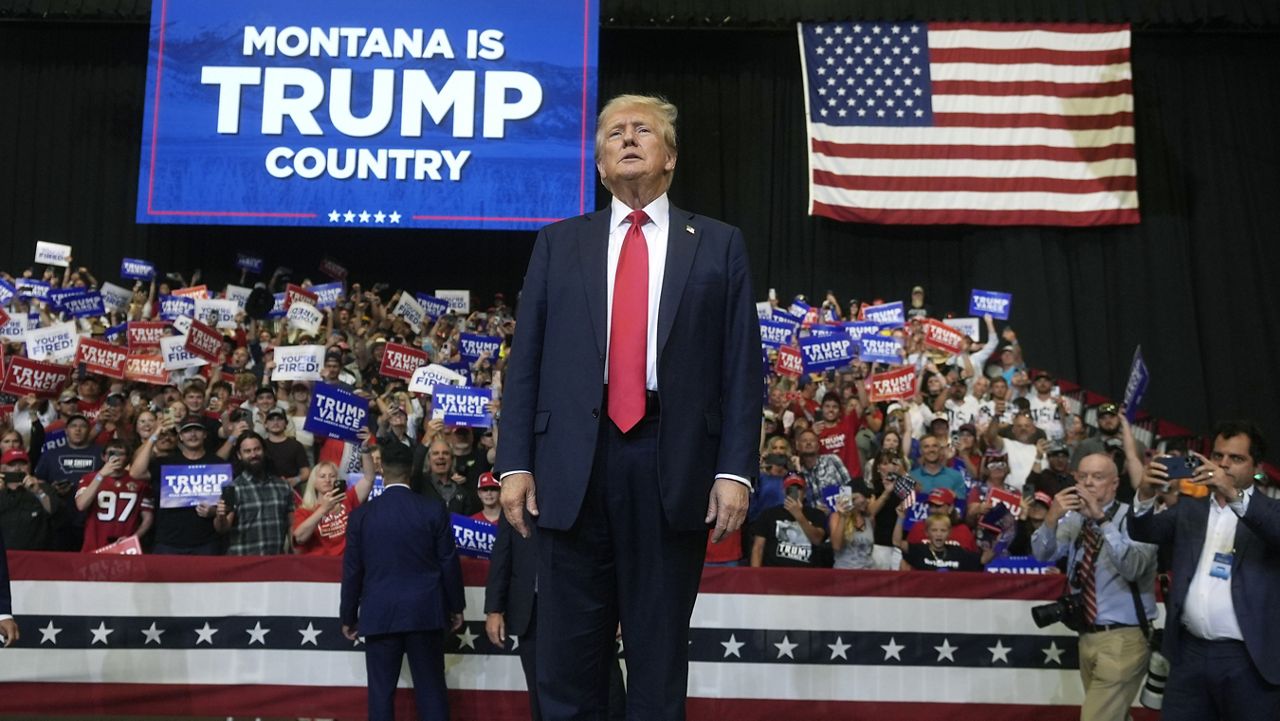The estate of soul legend Isaac Hayes is taking former President Donald Trump to court over what it says is his campaign’s unauthorized use of the 1966 hit song “Hold On, I’m Comin’,” which Hayes co-wrote. It’s the latest in a growing list of complaints from musical artists about Trump using their music.
What You Need To Know
- The estate of soul legend Isaac Hayes is taking former President Donald Trump to court over what it says is his campaign’s unauthorized use of the 1966 hit song “Hold On, I’m Comin’,” which Hayes co-wrote
- It’s the latest in a growing list of complaints from musical artists about Trump using their music
- Isaac Hayes III, the son of Hayes, wrote Friday on X, formerly Twitter, that a federal court granted a request for an emergency hearing on Sept. 3 in Atlanta “to secure injunctive relief"
- Representatives for Beyoncé, Foo Fighters, Celine Dion have also recently objected to their music being used by Trump
Isaac Hayes III, the son of Hayes, wrote Friday on X, formerly Twitter, that a federal court granted a request for an emergency hearing on Sept. 3 in Atlanta “to secure injunctive relief.” Isaac Hayes the singer, best known for "Theme from Shaft," died in 2008.
Trump, the Trump campaign, the Republican National Committee, Turning Point USA and the National Rifle Association — all defendants in Isaac Hayes Enterprise’s lawsuit — are required to appear at the hearing, Hayes III said.
The Trump campaign says it has a licensing agreement with BMI that allows the use of music at its events.
According to Hayes III, Trump and the groups used the song more than 134 times after they were warned multiple times to stop.
“If you're a political candidate and you want to use an artist's song, you have to get a political use license from one of the PROs (performing rights organizations) like BMI or ASCAP,” Hayes III said in a video he posted on X on Saturday. “Then you can play an artist's song at any campaign rally that you want to without any problem. Here's the problem: At some point, Donald Trump was notified to stop playing ‘Hold On, I'm Comin’” because that song was removed for his use from the political use license, and he kept playing the song.”
According to U.S. copyright law, a court can award a plaintiff up to $150,000 per incident if it finds the infringement was committed willfully. Hayes III has said he’s seeking “the cessation of use, removal of all related videos, a public disclaimer, and payment of $3 million in licensing fees.”
“Hold On, I’m Comin’” was a No. 1 hit on the Billboard Hot R&B singles chart in 1966 for Sam & Dave. The song was written by Hayes and David Porter.
The Hayes estate is not the first to object to the Trump campaign playing music.
After Trump campaign spokesman Steven Cheung posted a video last week using Beyoncé’s “Freedom” in a video posted to X showing Trump stepping off a plane, the superstar’s record label and music publisher sent a cease-and-desist letter to the Trump campaign, Rolling Stone first reported. Cheung later deleted the video.
Vice President Kamala Harris has been using “Freedom” as her campaign’s theme song. The former Destiny's Child member gave the Democratic nominee permission to use her song, per CNN.
Foo Fighters balked at Trump playing their 1997 song “My Hero” on Friday as he introduced Robert F. Kennedy Jr., during a rally.
A spokesperson for Foo Fighters told Billboard the band was not asked for permission, adding “appropriate actions are being taken against the campaign.”
In response to a question on X about whether they gave Trump the OK to use the song, Foo Fighters wrote, “No.” They then reposted a screen capture of the exchange with the message, “Let us be clear.”
Earlier this month, a statement on Celine Dion’s social media accounts said her management team and record label, Sony Music Entertainment Canada, did not give Trump permission to play a video of her signing her iconic 1997 ballad “My Heart Will Go On” at a campaign rally in Montana.
“In no way is this use authorized, and Celine Dion does not endorse this or any similar use,” the statement said, adding, “And really, THAT song?”
In March, Sinead O’Connor’s estate asked Trump not to play her music at campaign rallies, saying the “Nothing Compares 2 U” singer considered him a “biblical devil.”
In past years, the Rolling Stones, Adele, Rihanna, Neil Young and Aerosmith’s Steven Tyler have also objected to Trump playing their music.
Note: This article was updated to include a response from the Trump campaign.



